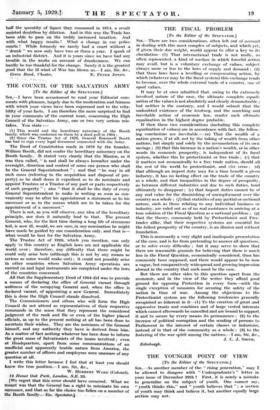THE FISCAL PROBLEM
[To the Editor of the SPECTATOR.] Sue,—There are two considerations, often left out of account in dealing with this most complex of subjects, and which yet, ' if given their due weight, would appear to offer a key to its elucidation—(1) That international trade is not really, as' often represented, a kind of warfare in which forceful action may avail, but is a voluntary exchange of values,' subject always more or less to the laws of supply and demand ; (2) that these laws have a levelling or compensating action, by which (whatever may be the fiscal system) this exchange tends to become, over the whole external trade of a country, one of
equal values. '
It may be at once admitted that, owing to the extremely involved nature of the ease, the ultimate complete equali- zation of the values is not absolutely and clearly demonstrable ; but neither is the contrary, and I would submit that the undoubted existence of the tendency, and the searching and inevitable action of economic law, render such ultimate equalization in the highest degree probable.
If then these two considerations (including this complete equalization of values) are in accordance with fact, the follow- ing conclusions are inevitable :—(a) That the wealth of a nation grows, if at all, not by the taking of wealth from other nations, but simply and solely by the accumulation of its own savings ; (b) that this increase in a nation's wealth, or in other words its economic prosperity, is independent of its fiscal system, whether this be protectionist or free trade ; (c) that it matters not economically to a free trade nation, should all the rest of the world be protectionist, and vice versa ; (d) that although an import duty may for a time benefit a given industry, it has no lasting effect on the trade of the country as a whole, and that inequalities in the degree of prosperity, as between different industries' and due to such duties, tend ultimately to disappear ; (e) that import duties cannot be of any real value for the diminishing of unemployment over the country as a whole ; (f) that statistics of any partial or sectional nature, such as those relating to any individual business or industry, are ruled out as of no real assistance in arriving at a true solution of the Fiscal Question as a national problem ; (g) that the theory, commonly held by Protectionist and Free- trader alike, that their respective systems are essential for the fullest prosperity of the country, is an illusion and without foundation.
This is necessarily a very slight and inadequate presentation of the case, and is far from pretending to answer all questions, or to solve every difficulty ; but it may serve to show that there are reasonable grounds for believing that there is much less in the Fiscal Question, economically considered, than has commonly been supposed, and there would appear to be now a vague, but comparatively widespread and growing impression abroad in the country that such must be the case.
But there are other sides to this question apart from the economic, and in the view of the writer they afford good ground for opposing Protection in every form—with the single exception of measures for securing the safety of the nation in time of war. Among the objections to the Protectionist system are the following tendencies generally recognized as inherent in it—(1) To the creation of great and oppressive trusts and combines and of large vested interests which cannot afterwards be cancelled and are bound to support it and to secure by every means its permanence ; (2) to the increase of political corruption and the sending of persons to Parliament in the interest of certain classes or industries, instead of in that of the community as a whole ; (8) to the fostering of the war spirit among the nations.—I am, Sir, &c., Edinburgh.
J. C. J. Sarre.






































 Previous page
Previous page